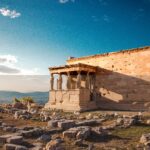Imagine stepping back in time, into the heart of an era where ancient civilizations flourished, and monumental triumphs were achieved. The world of Ancient Greek City-States unveils a tapestry of rich history, showcasing fascinating stories of power, conflict, and innovation. This article delves into the captivating realm of Ancient Greek City-States, shedding light on their unique characteristics, and exploring prominent city-states such as Athens, Sparta, Corinth, Thebes, and Syracuse.
Explore More: Interested in the daily life of Ancient Greece? Dive deeper into “Daily Life in Ancient Greece” for fascinating insights.
1. What is a City-State of Ancient Greece?
At its core, a City-State in Ancient Greece represented a self-governing city and its surrounding territory. These independent entities had their own governments, laws, and cultural identities, encapsulating the essence of Greek civilization. Each City-State had its own set of policies, military structure, and social hierarchy, making them stand out as individual entities within the broader Greek world.
2. Athens: The Beacon of Democracy
One of the most renowned City-States in ancient Greece, Athens is hailed as the cradle of democracy. This captivating metropolis was not only known for its forward-thinking political system but also for embracing the arts, philosophy, and literature. Under the influential leadership of statesmen such as Pericles, Athens soared to intellectual and artistic heights, leaving an indelible mark on subsequent civilizations.
3. Sparta: The Epitome of Discipline
In stark contrast to Athens, Sparta exemplified iron-clad discipline and militaristic prowess. The unique social structure, known as the Spartan way of life, molded its citizens into formidable warriors. Their rigorous training, unyielding discipline, and unmatched military strategy enabled them to become a powerful City-State, ready to defend their land from any threat.
4. Colonization and the Persian Wars: Shaping Greek History
The gradual expansion and colonization by the Greek City-States set the stage for an epochal clash with the Persian Empire. The Persian Wars brought City-States together, as they demonstrated remarkable unity, with Athens and Sparta emerging as prominent leaders. These conflicts fostered a sense of national pride and laid the foundation for the subsequent rise of Athens as the dominant force in the Greek world.
5. The Delian League and the Peloponnesian War: A Battle for Hegemony
Athens, in its pursuit of power, formed the Delian League, an alliance of City-States aimed at repelling Persian influence. However, this alliance soon succumbed to internal conflicts, resulting in the devastating Peloponnesian War between Athens and Sparta. This brutal conflict forever altered the course of Greek history, leaving both City-States weakened, and providing an opportunity for other emerging powers to rise.
6. The Distinctiveness of Sparta: A Singular Society
Sparta stood apart from other City-States due to its unique social structure. The famous Code of Lycurgus governed every aspect of Spartan life, focusing on physical training, military service, and the suppression of unruly individualism. This rigid system aimed to create an obedient and cohesive society, but also limited the cultural development and individual liberties enjoyed by its citizens.
7. The Distinctiveness of Athens: A Legacy of Intellectual Brilliance
In contrast to Sparta, Athens thrived in the realm of arts, philosophy, and literature. The city birthed legendary thinkers like Socrates, Plato, and Aristotle, whose philosophical insights shaped the collective wisdom of humanity. Athens’ dedication to the pursuit of knowledge left an enduring legacy, influencing countless civilizations in the centuries that followed.
8. Corinth: A Strategic Hub of Commerce
Situated on the Isthmus of Corinth, this City-State held a position of immense strategic importance. Connecting the Peloponnese peninsula to mainland Greece, Corinth became a bustling center of trade and a melting pot of diverse cultures. Known for its skilled artisans and flourishing industries, Corinth played a vital role in shaping the economic landscape of Ancient Greece.
9. Thebes: Rising from the Shadows
Once overshadowed by Athens and Sparta, Thebes rose to prominence after the Peloponnesian War. With notable leaders such as Epaminondas and Pelopidas, Thebes emerged as a formidable military force, challenging its more illustrious rivals. The Theban hegemony, albeit short-lived, showcased the resilience and potential of smaller City-States striving for recognition.
10. Syracuse: The Enigma of the East
Nestled on the island of Sicily, Syracuse offered a unique blend of Greek and indigenous cultures. Renowned for its rich architectural heritage and ingenuity in warfare, this City-State thrived as a cultural and economic powerhouse. Its tales of tyrants, illustrious mathematicians like Archimedes, and confrontations with Carthaginian forces continue to captivate the imagination.
Ancient Greek City-States: A Shared Identity and Culture
[youtube v=”ICRbPdvBbUQ”]
The ancient Greek civilization consisted of numerous city-states, each with its own unique identity, culture, philosophy, economy, leadership, and army. These city-states were often isolated from one another due to the mountainous landscape, and some islands in the Aegean Sea were also considered city-states. Some city-states were ruled by kings, while others were governed by tyrants. Interestingly, some city-states, like Athens, eventually transitioned into democracies where every citizen had the right to vote and participate in elections.
The Opposites: Athens and Sparta
Among all the city-states, Athens and Sparta emerged as the most powerful and influential. However, they were polar opposites in terms of their values and priorities. The Athenians were known for their education, culture, and love for wisdom and art. Athens, in fact, was the birthplace of democracy, where every citizen had the right to vote. On the other hand, Sparta had two kings and an assembly of elders. The Spartans were more interested in warfare rather than philosophy or the arts. They focused on training their boys to become fearless soldiers, and even the girls had to maintain physical fitness and strength to bear strong children in the future. The Greek historian and philosopher Plutarch acknowledged that the Spartans treated women with utmost respect compared to other city-states.
City-States at War
Although Athens and Sparta had contrasting values, they shared a notable characteristic: their affinity for war. Both city-states built strong armies and formed alliances with other city-states. Powerful city-states such as Athens and Sparta frequently engaged in wars, often fighting over territory and trade. The desire for more land, wealth, and power compelled city-states to resort to warfare. One of the most renowned conflicts was the Peloponnesian War, which occurred from 431 to 404 BC between Athens and Sparta. This war resulted in a significant victory for the Spartans and served as an example for other city-states that had aligned themselves with either Athens or Sparta. Consequently, it heightened ambition and made war appear desirable, as it showcased the possibility of defeating the strongest city-state in ancient Greece.
By analyzing the key points from the video transcript, it becomes clear that the ancient Greek civilization operated through a network of individual city-states, each contributing to the multifaceted tapestry of Greek culture and society. The polar opposites of Athens and Sparta exemplify the divergent values and priorities that coexisted within these city-states. Furthermore, the shared love for war and the consequences of conflict emphasized the competitive nature of ancient Greek city-states and their incessant pursuit of land, wealth, and power.
Conclusion
The tapestry of Ancient Greek City-States weaves together a vibrant blend of political, cultural, and military achievements. Athens and Sparta stand out as epitomes of democracy and discipline, respectively. Corinth, Thebes, and Syracuse add their own distinct flavors to the historical mosaic, shaping the ancient world as we know it. As we delve into their stories, the prowess and ingenuity of these City-States come alive, leaving an indelible mark on humanity’s collective memory.












